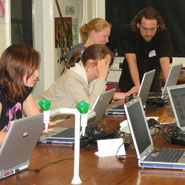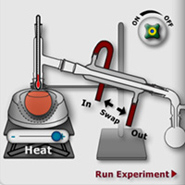A new software resource is set to transform the way A-level science is taught in schools.
The LabSkills Dynamic Lab Manual brings together expertise in virtual learning and practical science teaching in a format that has the potential to change radically the way scientific skills are developed.
The resource contains over one hundred interactive tools that enable students to explore experimental science before they enter the lab. In the pre-lab experience, students have the opportunity to optimise experiments, exploring different approaches and correcting mistakes along the way. They come to the laboratory with a greater understanding of what they are trying to achieve and how to achieve it.
Initial evidence suggests that students using the software perform better and engage in experiments with greater understanding and enthusiasm. This enables a shift in the classroom dynamic, with teachers able to spend their time proactively developing students’ practical skills.
Scientist and TV broadcaster Professor Kathy Sykes said: “Practical skills are crucial for success in science courses. This revolutionary resource can give students a chance to explore, question things and make mistakes before and after lessons, meaning they can use their valuable laboratory time much more constructively and efficiently. It's really important for students to be able to learn by doing and to be able to make mistakes from which they improve their understanding. This resource allows students to engage in scientific decision-making and provides a safe environment for them to experiment.”
The approach was pioneered at Bristol ChemLabS - the Centre for Excellence in Teaching and Learning in Practical Chemistry at the University of Bristol, where Chemistry undergraduates also prepare for laboratory classes with interactive web resources.
University teaching staff from the School of Chemistry worked with Learning Science and teachers from Southampton, Bristol, Leicester and Sheffield to develop the new material.
The technology was previewed earlier this year by the National Science Learning Centre in York and will be presented by the Wellcome Trust at the Association for Science Education’s annual conference in Reading in January 2009.
Launched at the start of September, over 200 schools have already registered to use the Dynamic Lab Manual, and there is growing interest in its use within teacher training courses run by the ten Science Learning Centres across England.

